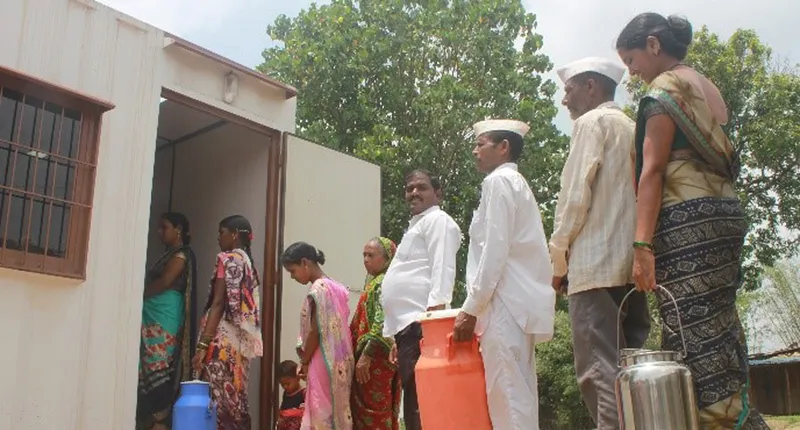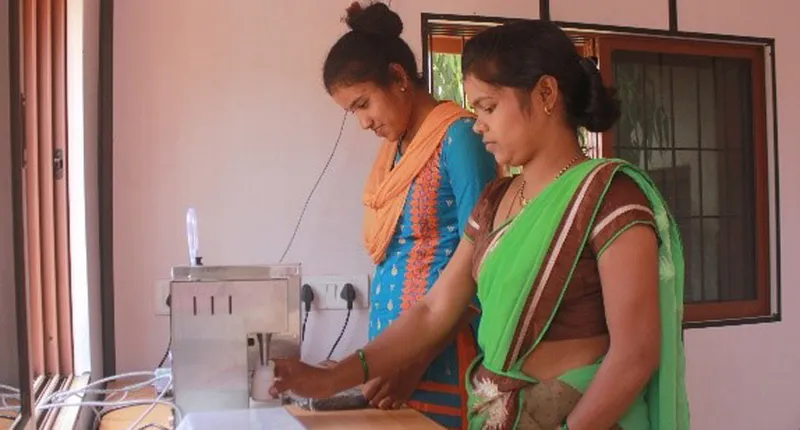Women dairy farmers ensure safe delivery of milk during coronavirus lockdown
Adopting safety measures during the coronavirus lockdown, women dairy farmers are ensuring that supply of milk to consumers is not disrupted while protecting the livelihood and economic interests of member farmers.

While strictly following safety measures to prevent spread of coronavirus, the women-led Dairy ensures supply of milk during the lockdown (Photo courtesy Krishnagopal, ALC)
Most activities in cities and towns across India have come to a standstill amid the lockdown to contain the spread of the novel coronavirus. In these times of unprecedented crisis, people are doing their bit, in every way they can. A stellar example is that of women dairy farmers who have refused to bow down to the crisis.
The gritty women farmers of Maval Dairy Farmers Services Produce Company Limited in Maval village near Talegaon in Pune District continue to procure, process, and supply milk, one of the essential services.
Maval Dairy is not only continuing its operations in ensuring milk processing and distribution in Pune district, but has also taken immediate measures to ensure safety for everyone involved in the supply chain and customers.
Maval Dairy
The efforts that went into building this dairy are helping it responding proactively to this crisis. Maval Dairy Farmer Services Producer Company was established for the community around Maval village of Pune District, Maharashtra, to strengthen their livelihood.

The file photo shows the women-led dairy benefitting women dairy farmers, who ensure supply of the essential product during this crisis (Photo courtesy Krishnagopal, ALC)
Back in 2016, during the formative years of Maval Dairy, it was part of Dairy A Farmers’ Group (DAFG), a collective of dairy farmers. Presently Access Livelihoods Consulting India Limited (ALC), a non-governmental organisation, and the CSR wing of Tata Power support the dairy.
“Initially, the collectives received support through feed for animals, loan services for animals,” Krishnagopal, Chief Executive Officer of ALC, told VillageSquare.in. “Call centres were set up to answer queries related to animal health.”
For and by women
Since there were very few active milk collection centres in neighbouring villages, the community felt the need for its own dairy. The primary focus was to involve women involved in animal husbandry.
Maval Dairy is India’s second and Maharashtra’s first women-led dairy. With representation from more than 20 villages, it has over 1,475 shareholders; 630 of them supply milk. ALC played a crucial role in training for compliance needs, and also in identifying and recruiting professionals.
Maval Dairy has created its market space in and around Pune, Pimpri-Chinchwad, Khopoli, Lonavala and other local markets nearby. It has a processing plant in Maval, with a capacity to process 10,000 litres of milk. There are 18 collection centres located between two villages for easy and quick access of farmers.
The income from the dairy not only supplements the income of women dairy farmers, but ensures steady, enhanced income. Women who used to sell milk at Rs 18 per litre to local vendors were able to sell the same to Maval Dairy at Rs 32 per litre.
Supply chain disruption
Milk is one of the basic necessities that the central government has included in the list of essential services. The national lockdown has affected the normal cycles of supply of milk to cities. But more important is the severe impact on thousands of dairy farmers across the country.
Dairying provides regular cash flow to thousands of small, medium, and large farmers, thanks to the nationwide network created during Operation Flood and hundreds of cooperative and private sector players in the country. All this has been affected by the present crisis.
Transportation of collected milk has also been a huge concern because in normal times, thousands of litres of milk are transported seamlessly by milk tankers across all parts of the country.
Uninterrupted operations during lockdown
In cities, the distribution network and system is impacted as distribution is limited and timed. There has also been an impact on processing volume, time, and associated staff.
Even though milk and its by-products, such as curd and buttermilk, are among essentials, collection centres near Maval village stopped collecting milk. But, observing the increasing cash flow disruption of dairy farmers, the women-led Maval Dairy decided to continue its support to members.
Now the onus is in ensuring that the dairy continues to function, which is critical for its 1,500 members. While other dairies in the region have stopped collecting milk from producer members, Maval Dairy has taken a courageous decision to continue safe collection, processing, and distribution.
The impact of the lockdown
Owing to current exigencies, the market rate for milk price has fallen. However, the collection has continued to safeguard the interest of all members. In fact, payment disbursement is done in advance.
“In the current situation, when all other businesses are suddenly at halt, members are dependent on dairy sales. Several members have even taken loans and cash flow is also disrupted for farmers,” said Krishnagopal, sharing the experiences of current dialogues with the community members.
Due to the poor scope of selling at established market places, the dairy has opted for bulk sales locally. As a supporting agency, ALC has been actively involved in connecting the dairy with local vendors.

The file image shows women measuring the fat content of the milk delivered at the collection center (Photo Courtesy Krishnagopal, ALC)
Despite the reduced procurement - from 6,000 to 3,000 litres a day - increased bulk milk sale with advance payment has helped improve cash flows and ensure that the marketing and sales teams are not exposed to unnecessary risk.
Safe procurement and distribution
Following the pandemic, Maval Dairy is taking precautions at employee and farmer level. They are diligently following distancing in collection queues. Masks, gloves, and sanitisers have been distributed to all centres to be used by everyone involved in collection, processing, and supply.
While planning operations to be carried out during lockdown, meetings involving a handful of people were conducted. They were given instructions on safety measures to be followed. They were made aware of the basics of the disease, and to not only keep themselves informed but also clarify apprehensions of consumers while delivering milk.
“The safety meetings were conducted for the entire staff, from procurement members and women who test milk to the secretary and members working in the plant and others in sales,” Lakshmi Bhagvanrao Mhatre, Chief General Manager of Maval Dairy, told VillageSquare.in. “There were also counseling meetings to answer the concerns of members.”
A positive approach
When several companies are introducing salary cuts or laying off employees in the informal sector during the lockdown, Maval Dairy has introduced a positive change by offering hardship allowances for volunteers who are working hard, ensuring safe procurement, distribution, and overall functioning of the dairy.
Drawn from the shareholder member pool, the volunteers are generally not involved in the day-to-day activities of the dairy. But with many unwilling to be involved now because of COVID-19, the shareholder members came forward to ensure the functioning of the dairy.
“The volunteers are receiving 30 percent of their salary as hardship allowance; this way the employment is continued in rotation, since the number of staff who work every day had to be reduced due to the need and implementation of safety measures,” Mhatre said.
Palak Gosai is a researcher at VikasAnvesh Foundation.
Disclaimer: This article was first published in VillageSquare.in. The views expressed by the author are his/her own and do not necessarily reflect that of YourStory.
Edited by Teja Lele







